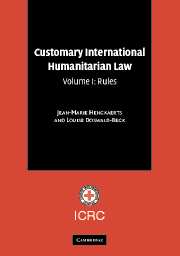Book contents
- Frontmatter
- Contents
- Foreword by ICRC President Jakob Kellenberger
- Foreword by Judge Abdul G. Koroma
- Foreword by Yves Sandoz
- Acknowledgements
- Introduction
- List of abbreviations
- Part I The Principle of Distinction
- Part II Specifically Protected Persons and Objects
- Part III Specific Methods of Warfare
- Part IV Weapons
- Part V Treatment of Civilians and Persons Hors De Combat
- Part VI Implementation
Foreword by Judge Abdul G. Koroma
Published online by Cambridge University Press: 05 June 2012
- Frontmatter
- Contents
- Foreword by ICRC President Jakob Kellenberger
- Foreword by Judge Abdul G. Koroma
- Foreword by Yves Sandoz
- Acknowledgements
- Introduction
- List of abbreviations
- Part I The Principle of Distinction
- Part II Specifically Protected Persons and Objects
- Part III Specific Methods of Warfare
- Part IV Weapons
- Part V Treatment of Civilians and Persons Hors De Combat
- Part VI Implementation
Summary
Sadly, it cannot be said that the incidence of armed conflict has become any rarer since the end of the Second World War. Rather, a host of conflicts across the world, both international and non-international, have highlighted as never before the extent to which civilians have become targets and the growing need to ensure the protection of the wounded, the sick, detainees and the civilian population afforded to them by the rules of international humanitarian law. Opinions vary as to the reason for the increasing number of violations of international humanitarian law. Is it a lack of awareness of the rules on the part of those who should observe them? Is it the inadequacy of the rules even where they are known? Is it weak mechanisms for enforcing the rules? Or is it sheer disregard for the rules? To some extent, there is truth in each. For international humanitarian law to be more effective, not one but all of these facets of the problem need to be addressed. Clearly, the first step in achieving the goal of universal respect for humanitarian rules must be the articulation of what the rules require; only then can the question of how to improve upon them be considered.
This study of customary international humanitarian law and its role in protecting the victims of war is both timely and important for a number of reasons.
- Type
- Chapter
- Information
- Customary International Humanitarian Law , pp. xii - xiiiPublisher: Cambridge University PressPrint publication year: 2005

